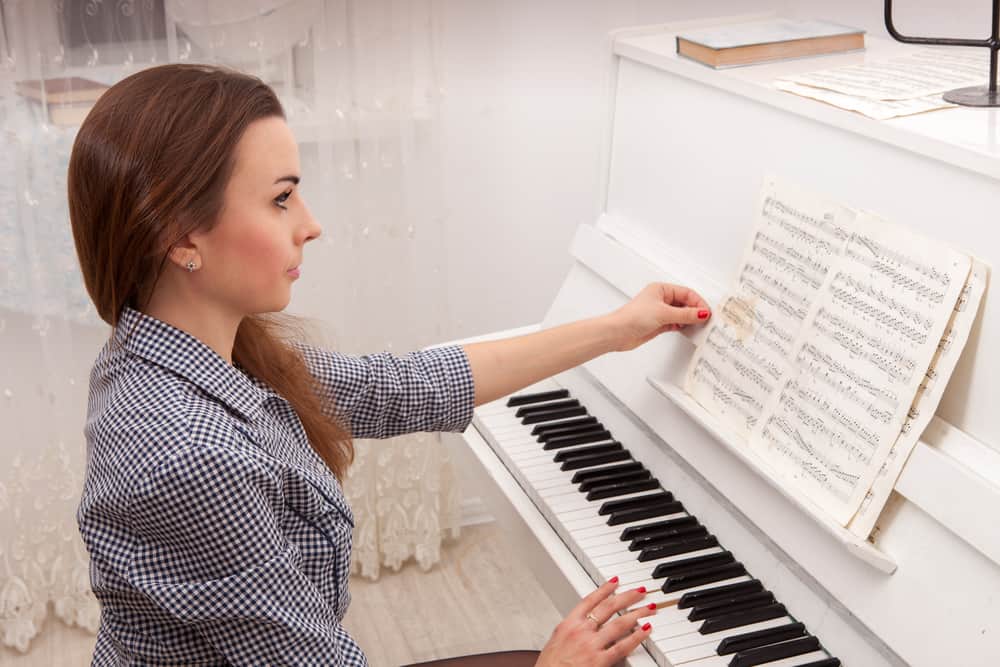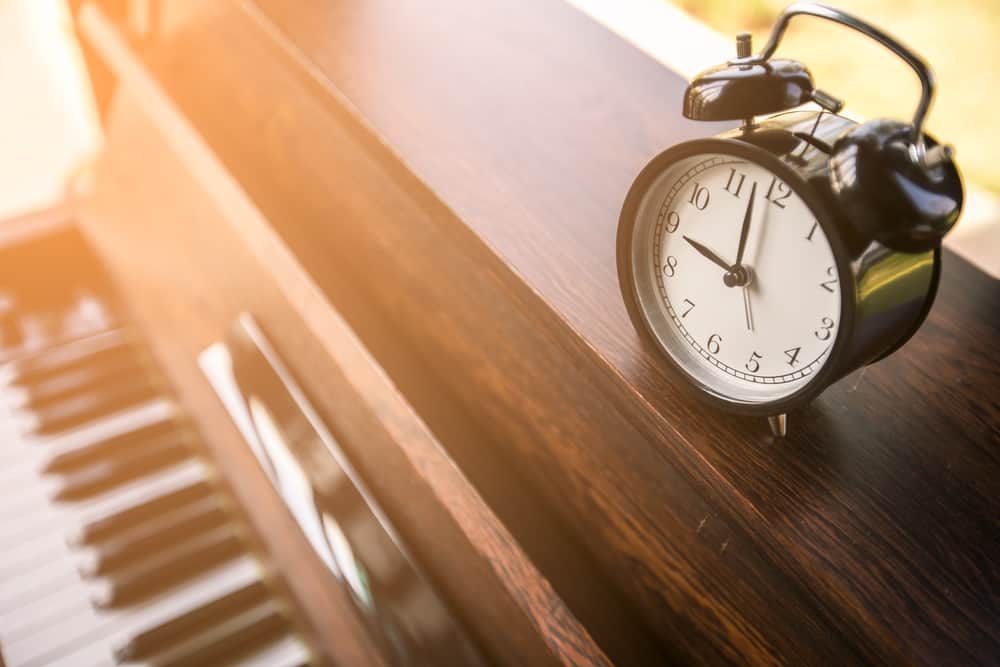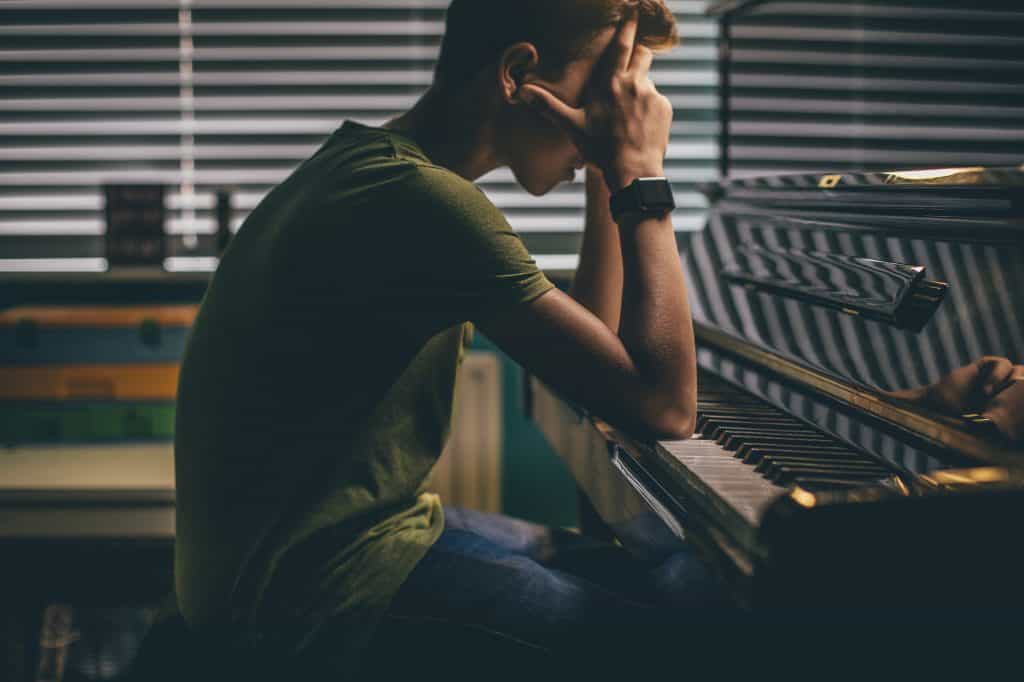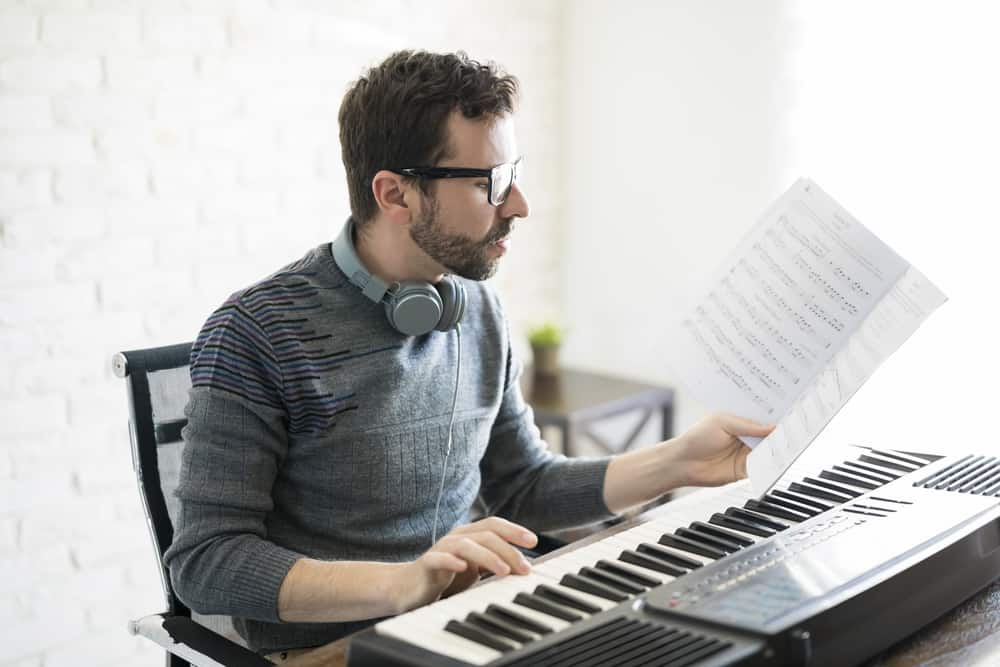Most of us would love to be able to play the piano, but not everyone has the dedication to see it through and turn themselves into an established pianist. Before you start your lessons, you might have some questions about playing piano, such as “is piano hard to learn?” and “how long will it take?” We aim to answer all of your questions in this guide.
Obviously, it is worth mentioning the fact that piano can be different for everyone. No two peoples’ experiences are identical when it comes to learning how to play piano. Some people find it quicker than others. Also, many of us have different learning styles and this plays a big part in the ways to learn piano as well as the time it takes.
Generally speaking, learning to play piano is a bit of a challenge, but actually, it’s not as bad as some other instruments, and most people can at least get to grips with some basics relatively easily.
What Do You Want to Play?
The first thing to work out when you are trying to learn. What will be success for you? There are many different levels of being able to play an instrument. Do you just want to be able to play some chords to accompany your singing, or do you want to be a virtuoso pianist!
There are so many variables in piano. People wondering how to learn piano fast will probably not be thinking about becoming classical pianists. If you want to be classically trained and learn the ins and outs of playing piano, all of the theory and technique, then it can take many years to get to a good standard.
The good news is that if you are satisfied with not knowing every aspect of the piano then you can get to the point where you can play basic, simple songs pretty quickly.
Think of it as whether or not you need to master the art or whether you are happy just being able to casually tinkle the ivories. Do you want to be able to read music, or are you satisfied learning by ear or learning by watching YouTube tutorials? There are some amazing musicians out there who don’t know how to read music. Consider what you want to prioritize.
How Long Does it Take to Learn Piano?
This is a question that is virtually impossible to answer in a short and simple answer. The length of time it takes to learn piano varies so much. However, we can provide some rough timescales and an idea of what to expect going into your early piano experiences.
As we’ve already alluded to, there are multiple ways to approach learning piano. If you go for “traditional” lessons, you might spend a lot of time focusing on scales, getting your hand technique perfected and the theory behind music. Some piano teachers insist on this before you can even think about learning to play a song. This is understandable, and it gives a very strong basis for your playing. It’s a good way to avoid errors creeping in.
Think of it a little bit like learning to drive, if you don’t learn how to drive properly then you might not be doing things perfectly. This is how bad habits develop. If you want to learn to become a classical pianist, you have to find a way to get joy out of this stage of learning, because it could be a while before you are learning songs. It can be years of playing every day until you get to the point where you can play perfectly. However, playing in this way means your skills will be more professional when you get there.
The good news is that if you don’t want mind not learning the theory, you can learn to play piano a lot more quickly. There are certain methods you can use that simplify the process and can give you a fast and effective way to learn to play. For example, people who have a little bit of musical knowledge already could potentially be playing a few simple pop songs within a week or two.
Learning the names of the notes and chords will probably be the first step for you. There are simple ways to do this. Effectively, the piano is just a pattern. There is an old saying “music is math” and basically, if you can work out the patterns then you can start playing chords. There are sets of rules to get you playing the basics very quickly, especially with one hand.
It is possible that after a few hours of playing you might be able to string together some melodies and some chords. There are challenges, you won’t be able to play perfectly, but you can play the basics and even be able to play some chords and melodies within a few hours that people will recognize. You can impress your friends.
How Hard is it?
There’s no point in laboring under any illusions. Piano is quite hard. The difficulties you experience are potentially quite different to those of other instruments, though.
One thing that is easier than with other instruments is the use of your hands. If you are starting to learn how to play guitar or bass, or even brass instruments, you need to learn the techniques around the hands or mouth. There are some techniques you can use on the piano, in terms of hand movements, but to actually start making sounds, all you have to do is press the keys. Anyone can start doing this in seconds.
The hard thing is getting used to timings, changing between chords, and doing everything quickly. Musicians are able to process and play things in a few seconds. You should see a “C” chord on your sheet music and know exactly what this looks like, and how to move your hands into position.
These tasks individually aren’t that hard. Putting them together at speed is the hardest thing about it. The only way to do this is practice. Many people find that the best methods for how to learn piano faster is to practice little and often. 30 minutes a day will soak in better than long, three or four hour practice sessions that can frazzle your brain.
Naturally, the other aspect of learning to play piano that is pretty hard is being able to use both hands. Though you can play some simple melodies one handed, it is very hard to be able to use two hands. Again, the only real answer to this is to practice. You will need to learn the left handed parts and the right handed parts separately, before combining them together. This is something you can easily get wrong. You will make a lot of mistakes, but this is part of the learning process.
Investing time can feel like a drag, especially if you aren’t getting things right. However, it is the only answer. You will eventually pick things up, and though it can feel like a dead end road at times, you need to stay patient (more on this later).
The method of learning songs quickly and worrying more about the theory at a later date is one that can keep you engaged better. It is more enjoyable to be able to pay along with your favorite songs, even if your theory is not perfect.
What Makes it Hard to Learn Piano?
What are the biggest obstacles to playing piano. The following are the main ways that piano is difficult. The challenges you experience may not be exactly the same as someone else. People find their own obstacles to learning. This is dependent on your learning style and personality as well as the actual piano playing.
Reading music
This is an area a lot of people struggle with. Sight reading (the ability to read music and play what you are reading simultaneously) is something that can take years to master. The very best musicians can find this tough. Any form of reading music can be tricky and is usually a slow process.
You don’t need to learn how to read music. Not necessarily, anyway. Elvis Presley, all of The Beatles, Jimi Hendrix and plenty of other musicians got by without the ability to read music. It might be limiting, but it isn’t essential that you know how to read music. You can also learn this at a later date, once you can already play some songs.
Using both hands at once
This is a big challenge. Most people can get the hang of playing chords with one hand and a melody on the other, or playing bass notes on one hand and chords on the other, but putting them together is the challenge. You may be able to play both individually, but when you try them simultaneously you struggle.
The brain needs to adjust to this, and you need to build up to it. Try playing something really simple with one hand while you use the other hand, too. Even playing the same thing with both hands will start to get your brain using both. When we see musicians multi-tasking, it’s hard to understand how they are doing it. Drummers can use all four limbs doing different things at the same time! The truth is that the route to this sort of playing is practice and plenty of it.
Patience
I would say this is the number one reason that people don’t carry on with lessons and get to the point where they can play piano. They run out of patience. It’s a bit like learning to walk, you will keep falling over and making mistakes. The difference is that we have to learn to walk, but we can easily quit piano. Most people do! Below, we have included some tips on staying patient with your piano playing.
Staying Patient While Learning Piano
If I tell you just to “be patient” when learning how to play piano, it’s not going to help you at all. This advice is not actionable. Instead, you need some tips on how to remain patient. How can you cope with the fact that it is a slow process and you won’t pick things up overnight?
Some people may instantly know that patience is going to be an issue. If you are the sort of person who hates waiting for something to download, the chances are you are going to find learning piano frustrating at times. Most people do!
So, what are the top tips for patience? How can you stay patient through the process of learning piano?
Get a decent keyboard or piano to learn on
I know, this involves cost, which isn’t ideal. However, trying to play on a cheap and unreliable piano will add a lot to your frustration. Cheap keyboards have cheap keys, and this means they don’t have the same functions such as hammer action. This means you aren’t getting a realistic experience of the keys. When you eventually switch to piano, it can be like learning all over again.
You should be able to rely on your piano or keyboard when learning, and this can help you to stay patient throughout.
Another key to staying patient is to not let playing piano take over your life
Don’t start practicing for five hours a day to try and learn piano fast. This will lead to you burning out, and you will not want to play piano anymore by the end. Playing for about 20-30 minutes a day is a better way to learn. The information is likely to go in a lot more effectively if you learn this way, too. After 3 hours of watching tutorial videos, you might well have lost attention and your brain might not be functioning at full capacity!
At the risk of sounding a little bit corny, the best advice when it comes to learning piano is to fall in love with the process. Wanting to be a virtuoso pianist is fine, but the motivation has to come in shorter bursts. For instance, you need to set smaller targets on the route to being able to play like a pro. Don’t set yourself the task of playing Beethoven within a week, when just being able to play Three Blind Mice would be an achievement. Enjoy the little wins, and enjoy the process of learning as much as you can. Reward yourself and get feedback.
What Can You Do to Learn Piano Faster?
So you might have visited this article because you are wondering how to learn piano fast. Nothing is going to make you play super quickly. Even though it would be great to have a matrix-style chip implanted into your brain and be able to play instantly, it just isn’t realistic. However, there is plenty you can do to make the process much quicker in general than it would be otherwise. Our top tips to learning piano faster can make it less likely that you will become frustrated and give up.
Pick one course or tutor and stick with it
Many people flit between instructors, changing from one course to the next or just searching for YouTube videos on specific areas of how to learn piano. This is okay, and you can pick up a lot of information, but this is just taking in random chunks of info.
Instead, it is best to follow a specific course which has been designed to show you how to play, with no gaps in your knowledge. People and companies developing courses spend a lot of time and money working out how to structure their courses as something specific that can be easily followed. By following one course, you can avoid the chances of gaps in your knowledge and generally keep the process simpler. Following one course is much simpler than following sections of multiple, or random YouTube videos.
Bypass some of the theory (for now)
You don’t need to know everything about music theory in order to start playing songs. You can always revisit and learn the theory at a later date. Following tutorials doesn’t have to mean knowing exactly what is happening and why while you are playing. As long as you can recreate the piece of music, you can be happy with your playing. As I mentioned at the start of the article, there are many musicians who don’t have the ability to read music. This is an example of bypassing some of the theory.
Daily practice
No excuses. You can’t make up for not practicing one day by doubling the time the next. Piano is a habit that you should follow daily in order to get to the stage where you can play well. This is especially true if your goal is to learn piano fast. Even if you don’t have your piano available, make sure you revisit some lessons or even just watch tutorials without the piano to try and take in the information. Going four days without practice can put you back weeks in your process. If you only have 15 minutes to spare, make sure you spend it wisely practicing your piano pieces.
Play with others or get a tutor
This is a hugely useful piece of advice. If you are making mistakes, you may not even realize until you play with others. Even if you have occasional sessions with a piano tutor, they will be able to pick up on mistakes you are making. They’re also likely to be able to feedback on any bad habits you are picking up and to help you stamp these out. There is a lot of information available to allow you to learn piano solo, but without other peoples’ help you may be missing something.
Nobody said piano was easy, but if you break it down into manageable lessons and stick at it, you can be playing in a relatively short period of time, and at least nailing the basics within weeks. You can spend your whole life playing and never mastering the piano completely, so be prepared to never be perfect.





